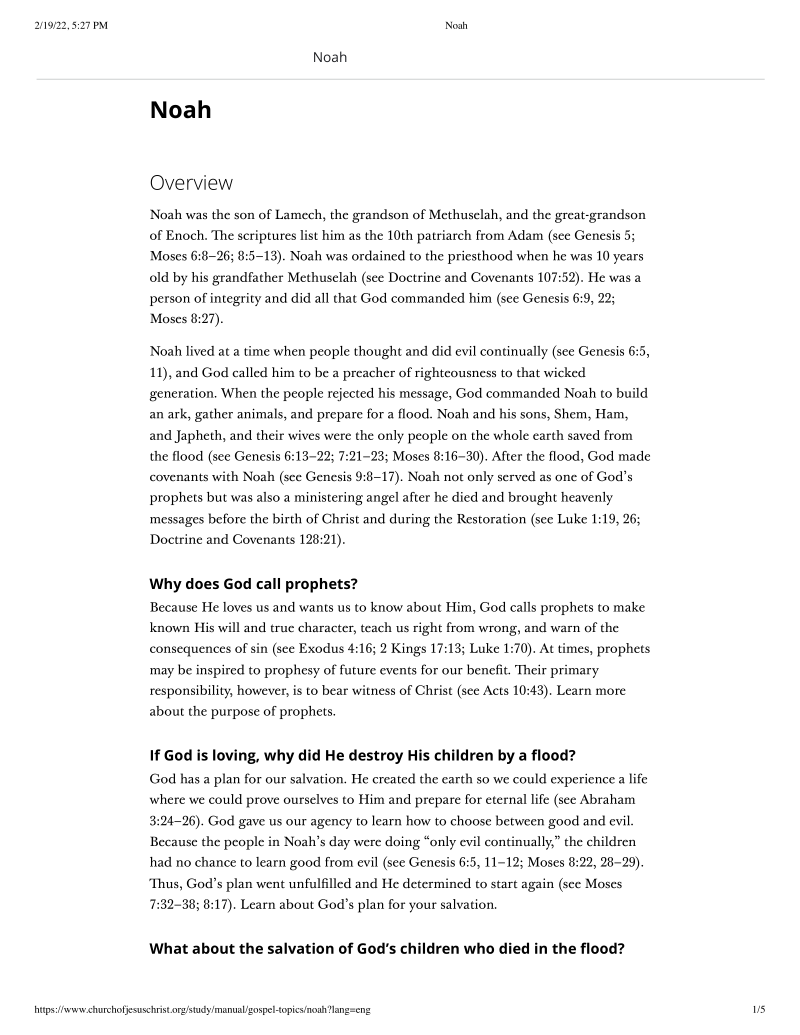LDS Gospel Topics essay on Noah and the Flood.
- Type
- Website
- Source
- The Church of Jesus Christ of Latter-day Saints LDS
- Hearsay
- Direct
- Reference
"Noah," Gospel Topics, The Church of Jesus Christ of Latter-day Saints, accessed February 19, 2022
- Scribe/Publisher
- The Church of Jesus Christ of Latter-day Saints
- People
- Elizabeth, Lamech, Noah, Methuselah, Jesus Christ, Shem, Enoch, Gabriel, Zacharias, Joseph Smith, Jr., Ham, The Church of Jesus Christ of Latter-day Saints, Japheth, Adam
- Audience
- Reading Public
- Transcription
Overview
Noah was the son of Lamech, the grandson of Methuselah, and the great-grandson of Enoch. The scriptures list him as the 10th patriarch from Adam (see Genesis 5; Moses 6:8–26; 8:5–13). Noah was ordained to the priesthood when he was 10 years old by his grandfather Methuselah (see Doctrine and Covenants 107:52). He was a person of integrity and did all that God commanded him (see Genesis 6:9, 22; Moses 8:27).
Noah lived at a time when people thought and did evil continually (see Genesis 6:5, 11), and God called him to be a preacher of righteousness to that wicked generation. When the people rejected his message, God commanded Noah to build an ark, gather animals, and prepare for a flood. Noah and his sons, Shem, Ham, and Japheth, and their wives were the only people on the whole earth saved from the flood (see Genesis 6:13–22; 7:21–23; Moses 8:16–30). After the flood, God made covenants with Noah (see Genesis 9:8–17). Noah not only served as one of God’s prophets but was also a ministering angel after he died and brought heavenly messages before the birth of Christ and during the Restoration (see Luke 1:19, 26; Doctrine and Covenants 128:21).
Why does God call prophets?
Because He loves us and wants us to know about Him, God calls prophets to make known His will and true character, teach us right from wrong, and warn of the consequences of sin (see Exodus 4:16; 2 Kings 17:13; Luke 1:70). At times, prophets may be inspired to prophesy of future events for our benefit. Their primary responsibility, however, is to bear witness of Christ (see Acts 10:43). Learn more about the purpose of prophets.
If God is loving, why did He destroy His children by a flood?
God has a plan for our salvation. He created the earth so we could experience a life where we could prove ourselves to Him and prepare for eternal life (see Abraham 3:24–26). God gave us our agency to learn how to choose between good and evil. Because the people in Noah’s day were doing “only evil continually,” the children had no chance to learn good from evil (see Genesis 6:5, 11–12; Moses 8:22, 28–29). Thus, God’s plan went unfulfilled and He determined to start again (see Moses 7:32–38; 8:17). Learn about God’s plan for your salvation.
What about the salvation of God’s children who died in the flood?
The scriptures teach that God prepared a prison for those people who died in the flood and that Christ suffered for their sins (see Moses 7:38–39). We learn from other scriptures that this prison was a spirit prison and is a temporary place in the spirit world for those who pass away. Learn more about the spirit world.
What is the symbolism of Noah and the flood?
God uses symbols to teach gospel truths. In the New Testament, Peter explained that the flood was a “like figure” or symbol of baptism (1 Peter 3:20–21). Just as the earth was immersed in water, so we must be baptized by water and by the Spirit before we can enter the celestial kingdom. Also, Noah himself was a symbol of Christ. It was necessary for any living creature who wished to be saved to come “unto Noah into the ark” (Genesis 7:9, 15). Learn more about ordinances that are necessary for your salvation.
What role did Noah play in the events surrounding the birth of Christ?
Noah was also known as the angel Gabriel and was sent to announce the birth of Jesus Christ (see Luke 1:19, 26; Teachings of Presidents of the Church: Joseph Smith [2007], 104). He was sent by God to tell Zacharias that he and his wife, Elisabeth, would have a son they should name John. This was John the Baptist, who would prepare the way for the Savior (see Luke 1:5–23). Gabriel also visited Mary and told her that she would be the mother of the Son of God (see Luke 1:26–38). Learn more about the birth and life of Jesus Christ, our Savior.
What role did Noah play in the Restoration?
Along with other heavenly beings, Noah appeared as the angel Gabriel to Joseph Smith, “declaring their dispensation, their rights, their keys, their honors, their majesty and glory, and the power of their priesthood” (Doctrine and Covenants 128:21). Learn more about the Restoration.
What are covenants and why does God make them with us?
A covenant is a sacred agreement between God and a person or group of people. God sets specific conditions, and He promises to bless us as we obey those conditions. When we choose not to keep covenants, we cannot receive the blessings, and in some instances we suffer a penalty as a consequence of our disobedience. Learn more about covenants.
- Citations in Mormonr Qnas
The B. H. Roberts Foundation is not owned by, operated by, or affiliated with the Church of Jesus Christ of Latter-day Saints.

